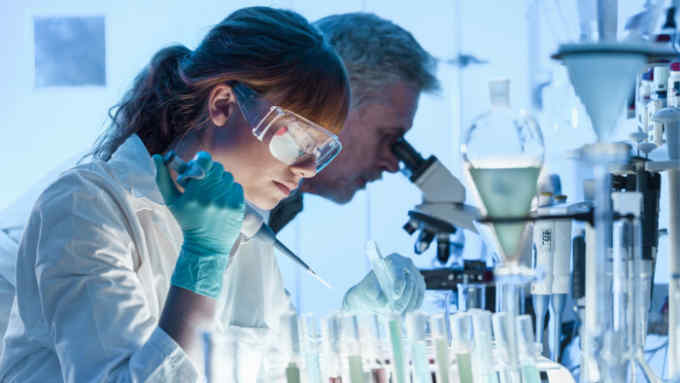How to get the world from Covid-19 to Covid-Zero with just $8bn | Free to read

Roula Khalaf, Editor of the FT, selects her favourite stories in this weekly newsletter.
This article is a part of a series in which leading commentators explore innovative scientific, medical and epidemiological approaches to the Covid-19 pandemic
The writer is director of the Wellcome Trust
The extreme measures taken to shut down whole countries and ask citizens to stay at home, with their painful social and economic consequences, are necessary to contain the coronavirus outbreak. But they will not bring the crisis to an end. For that there is just one way out: science.
This is the only exit strategy we have from the pandemic. It is the route from Covid-19 to Covid-Zero: no more deaths; no more job losses; no more economic disruption. Without it, we risk a rolling cycle of lockdowns and distancing measures as outbreaks ebb and flow around the world for months, if not years, to come.
The good news is that it is a solvable problem. But it is only solvable if the finance is there and, at present, it is not. While governments are spending hundreds of billions of dollars, most is understandably focused on protecting health and economies.
The science that will provide the exit strategy is short of at least an immediate $8bn, according to the Global Preparedness Monitoring Board, an independent expert group convened by the WHO and the World Bank. It is a fraction of the total cost of the pandemic. Scientists around the world are mobilising at unprecedented speed, but nations are committing funds too slowly. If the gap isn’t filled by the end of this month, crucial opportunities to advance promising drugs and vaccines and scale up production will be missed.
Corporations, investors and philanthropists can play a critical role in filling the gap by helping fund this vital science themselves, and influencing their governments to do the same. In doing so, they will save not only countless lives, but businesses and economies too.
The Wellcome Trust is today inviting them to join the Covid-Zero initiative. If corporations took just 10 per cent of the funds they are spending on managing the pandemic and gave it to the science that will resolve it, we would rapidly make up the financing gap.
Some businesses have already appreciated the need. Mastercard has contributed $25m to a joint initiative with Wellcome and the Bill & Melinda Gates Foundation. Citadel, the investment fund, has funded CEPI, the organisation that supports vaccine research.
However, much of the business world’s contribution to date has been focused on managing the immediate impact of the pandemic.
Many companies have made strong commitments to support their employees, customers, suppliers and communities through what is perhaps the gravest global crisis since the second world war. And all at a time when they are themselves counting the costs of lockdowns and physical distancing.
Others have joined more directly in fighting the outbreak. Amazon is distributing coronavirus tests, Diageo is making hand sanitiser, while Formula 1 teams are designing ventilators.
But business has a powerful opportunity to go further and play a critical part in resolving the crisis — as well as in managing it — by helping fund the vital research that provides the only viable exit strategy that can bring the world back to business as usual.
We need a vaccine to halt the spread of the virus and to protect people from becoming infected. We need treatments to stop sick people from dying, and to keep them out of hospital and intensive care, so relieving the pressure on health systems. We also need better tests to identify the infected and track the course of the pandemic.
We must scale up production capacity now, before we know which vaccines and drugs will work, so that when the breakthroughs come we can swiftly manufacture the millions of doses that the world will require. And we must work together, treating these vital medicines as shared global goods which everyone receives equitably.
No one can predict which efforts will succeed, or in which country. But everyone will want and must have access these drugs. We must share the risks and benefits.
I understand that global financial instability, combined with economic and social disruption, make this request difficult for leaders in the worlds of business and investment. But the resources needed now are tiny compared to the costs that businesses and institutions of all kinds have incurred and will continue to incur until the world puts this crisis behind.
As it happens, this investment in medical funding would be in keeping with the rise in the belief in stakeholder capitalism: the idea that business exists for a purpose beyond profit or shareholder value and that its true calling is to create shared social goods for the world at large.
It also makes hard-headed sense. Science is the only way we will be able change the course of this pandemic and get the world back to business. Funding that solution is the best possible investment that any business can make today.

Comments